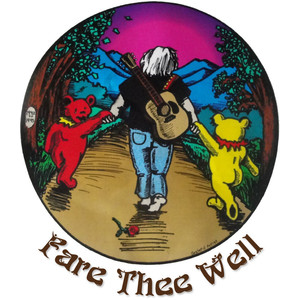(Special guest blog post by Todd Bauer)
As I approached Soldier Field on July 5th, 2015 for the final Grateful Dead show of all time, (and my 33rd), I was a bundle of emotions. I was holding back tears the entire show, and choked up when talking to my wife at set break. This intensity of emotion came as a surprise to me as I had made no effort to get tickets to these final three shows. I would not have been there at all if not for my younger brother Scott lining everything up for me. I still loved the Dead’s music, but going to shows was part of a younger me, and, of course: no Jerry. I was skeptical and hesitant. By the end of the first set of the first show, I was back in bliss.
Thank God my brother got me there, for attending those final three shows was the capstone of my 30 year Grateful Dead journey: one of the most profound experiences of my life.
As Scott wrote concerning the final shows in an earlier blog “It took us 20 years to be ready to say goodbye,” and it has taken me a year to integrate that goodbye. What follows is my best attempt to put into words, something that ultimately, is beyond words. As a critic from the 1980’s said “It is not easy to know what makes the Grateful Dead important, but it is important. That is certain.” Attending those final shows, reminded me just how important the Grateful Dead have been, and will always be, to me.
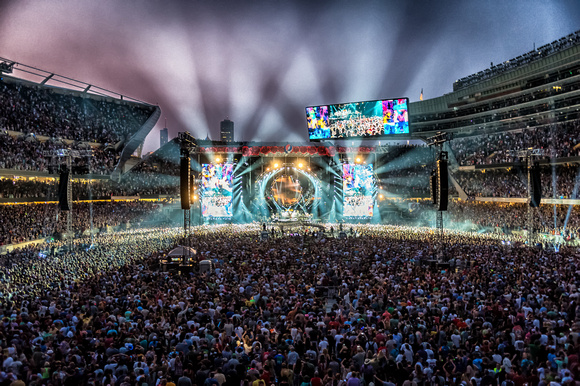
“We sing when words are not enough.”
–Jonathan Wilson, theater director
I think it was Martin Mull who said “writing about music is like dancing about architecture.” I think that’s true, but in attempting to explain the phenomenon of the Grateful Dead, we have to begin with the music. At their most basic, they were a band. The most American of all rock n roll bands. Ever. For reasons both within and beyond the music.
Their music sprung from the Myth of America. For just as we are a melting pot of people f every race, creed, and color, their music was a melting pot of roots, folk, blues, jazz, reggae, world, rock and many others. As Bob Dylan said on the death of Jerry Garcia “There are a lot of spaces and advances between the Carter family, Buddy Holly, and say Ornette Coleman, a lot of universes, but he filled them all, without being a member of any school.”
The Dead’s music came out of, and embodied the American identity. And the way they played it, the way they approached their craft, embodies that identity at an even deeper level. Individually they ranged from gifted to genius on their instruments, but together, there was a synergy that went far beyond the sum of its parts. As a critic noted “”The Grateful Dead are the most consistently cohesive band in the history of rock n roll.” That cohesion was solidified by playing over 2300 shows—a historic accomplishment in and of itself.
“Maybe we’re one of the last adventures in America.”
–Jerry Garcia
Central to the American consciousness is the idea of possibility. This is the Land of Opportunity! Our greatest export: the idea of the American Dream. This belief in potential was forged by having a frontier where anything was possible. As Wallace Stegner famously said “something will have gone out of us as a people if we ever let the remaining wilderness be destroyed.” Frontier, wilderness, exploration, allows for possibility and dream to exist.
The Dead went into every show without a net, not knowing what they were going to play, or how they were going to play it. Every song was an exploration, a journey, an adventure. So American. Going to a Dead show was in the long American tradition of going into the wilderness. And we all, band and audience, went on that adventure together.
“[The Grateful Dead is] six musicians struggling to play music. But there is something that happens. The audience is going through a transformation, we’re going through a transformation. The unexpected becomes every day. You don’t take it for granted. You work at it real hard but you don’t work at in the usual ways. It is something that just has to happen. You set the stage for magic to happen. Sometimes it does.”
–Jerry Garcia
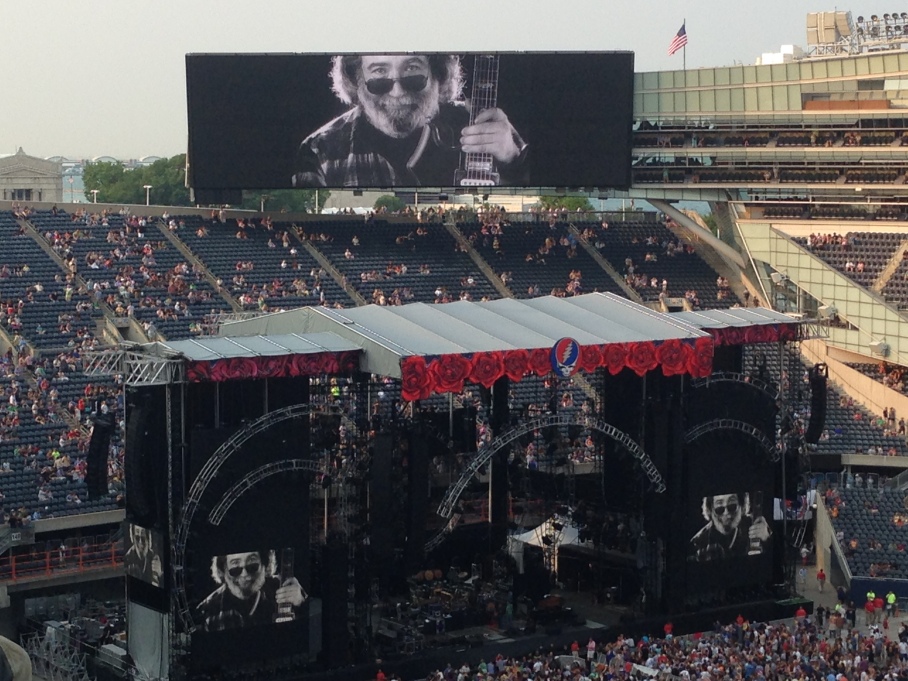
As anyone who has been to a live sporting event in a large, sold out stadium, with the game on the line knows: there’s an energy there that transcends the event going on on the field. When the winning field goal is kicked, or the three-pointer drained as time runs out, the electricity created could light a city. Can’t be described; is not the same as watching it on TV; can only be experienced in that moment.
Now picture that level of electricity without an opponent; where aggression, conquest, the possibility of defeat, and competition are not part of the equation. The energy is exclusively that of collective harmony and joy. That’s the magic of a Dead show. As a critic noted “Grateful Dead music became culturally important…because it helped bring people together and conveyed the spirit of a better way to live.”
Or, put more succinctly by another critic “The Grateful Dead elicit more human energy in one show than most groups do in a career.” It was a place where your first impulse is to trust, rather than be apprehensive; a place where it is impossible to be weird, where you are utterly free to be yourself without judgment; universally accepted. How democratic.
As mentioned above, the Dead’s music, and the way they approached it, tapped into something deep in the American consciousness. And when the audience is brought into the experience, it transforms into something even more powerful. Something that transcends ethnicity, national identity and many other boundaries. It taps into something on a basic human level and very old.
At the ripe old age of 81, noted mythologist Joseph Campbell attended his first Grateful Dead show and was blown away. He commented “The Grateful Dead are the answer to the atom bomb. For the atom bomb is a function of separation…people are separated from each other by lines of thinking. They align themselves with this group against that group. An evening with the Grateful Dead is one of those harmonizing experiences. All differences between age, race, and economic situation were simply erased. People were seeing themselves as human beings having…a common experience, an experience of joy and fulfillment and life in play…the more of that we can bring forth, the less there will be any trend toward the separation which the atom bomb represents. They hit a level of humanity that makes everybody at one with each other. I was carried away in a rapture. And so I’m a Deadhead now.”
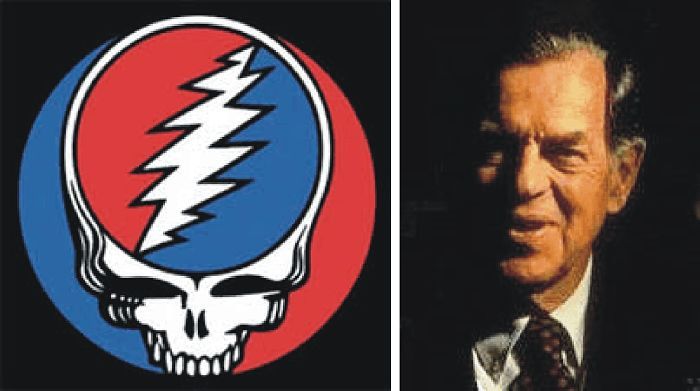
And Campbell was not alone. I was hooked after my first show. Other Deadheads have commented: “My soul was more at peace than ever before.” And “At my first show I immediately felt like I was at home, and I fit in. Everyone was friendly and I quickly learned that the way I could live my life was much broader than I had grown up believing.”
Places where such levels of harmony and expansion are achieved are sacred. And sadly scarce in modern society. Garcia realized this, saying “That remained my goal, to walk out every night and play as if life depended on my every note, to wrest meaning from the jaw of entropy and decay, and to transform every place we played into a shrine of expanded consciousness. Every place we played was church.” And Phil Lesh stated “After the Acid Tests, we had become shamans, helping to channel the transcendent into our mundane lives and those of our listeners.”
Ritualistic ecstasy may be very rare in today’s culture, but it is nothing new. In fact, it is very old.
“Nietzsche argues that the tragedy of Ancient Greece was the highest form of art due to the mixture of both Apollonian and Dionysian into one seamless whole, allowing the spectator to experience the full spectrum of the human condition.”
–Nietzsche scholar
At an elemental level, we are a chaos of atomic energy, brought into a harmony, a rhythm, an order to form differentiated body and consciousness. Just as words convey meaning by bringing the elements of letters into an order, or music disparate notes into a harmony. (The Dead conveyed this every time they evolved out of “Space” into a song).
Campbell points out “Life is rhythm. Art is an organization of rhythms. [The Dead] is one incredible Dionysian ritual. It’s as if the rites of ancient Athens were compressed into one concert in one evening. I got something there that made me note that this is magic. And it’s magic for the future. The Grateful Dead are a contemporary container of the body of wisdom that is relatively timeless.”
Phil recognizes this: “We’ve moved into a timeless realm where only the music and the people listening exist.” As did a critic in 1970 “Magic is alive and well. It exists in the form of one of the few truly unique bands rock has produced: the Grateful Dead. They are an overwhelming almost mystical experience”
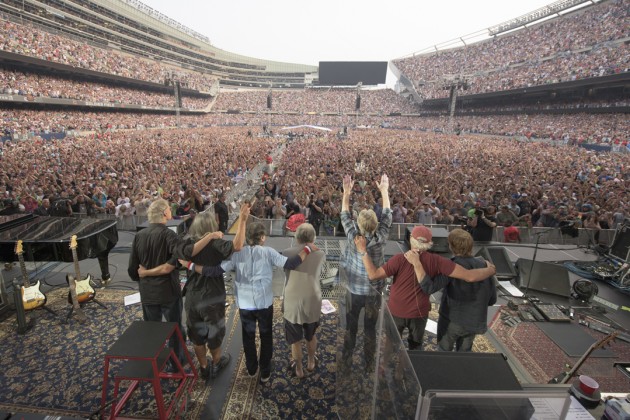
“I found the Grateful Dead right when I needed them. I guess that’s about the time most people find them.”
–Deadhead
At my first show (which I had the clichéd pleasure of going to in a hollowed out VW microbus that ran out of gas as we pulled into the parking lot) three large bolts of lightning descended directly behind the stage at the precise moment the Dead hit the first note of the first song of the second set. It was cosmic! Little did I know such hinges were common at Dead shows.
As the Dead play “Fire on the Mountain” in Portland, Oregon Mt. St. Helens erupted.
At Jerry’s last show, after the typical one song encore, Phil felt moved to launch into “Box of Rain” with the final lines “Such a long, long time to be gone. And a short time to be there.” The final notes Jerry would play with the band.
And as the first set ended of the first Farwell show, a rainbow appeared above the stage.
The movie that awakened my sense of wonder, the original King Kong, came out in 1933; the first time I ever played roulette I put my money on 33 and hit the number; I met my wife and embarked on my theater career when I was 33.
I saw the Grateful Dead exactly 33 times. It took a show I had tickets for being cancelled, and getting tickets to all three of their final shows for this to be a fact.
Although such cosmic connections cannot be proven, they did happen. And there are many, many more. Ask any Deadhead.
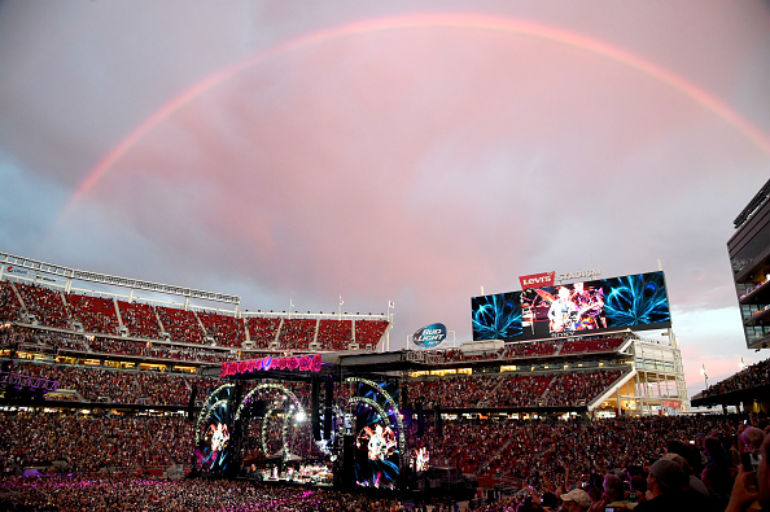
“[The Grateful Dead] are somehow hitting that chord of realization of the unity of God in you all, that’s a terrific thing and it just blows the rest away.”
–Joseph Campbell
Joseph Campbell is best known for the phrase “Follow your bliss.” This is often mistakenly interpreted as, just do what makes you happy. More correctly, it means, honor the deepest calling within you in living your life. This will not always be fun, or easy, will involve risk and disappointment, but when you do, “doors will open for you where there wouldn’t be a door for anyone else” and you will have the experience of being alive that is most meaningful to you.
Campbell’s teachings found me at precisely the moment in my life I needed to hear them, and they guided me to that path of deepest calling and experience.
The Dead were a part of that calling, and doors did open for me with regard to them. My first show was included in the recently released 30 Trips Around the Sun boxed set, selected as the best show of that particular year. One of my best friend’s Aunts became the Dead’s road manager, and several times I got backstage which was always a thrill. Just by chance I ended up at one of the few shows where the Neville Brothers joined the band; at Brent’s last and Vinnie’s first show; and most meaningfully, at Jerry’s last, and the band’s final three—all of which just happened to take place in my home town: Chicago. For me, it was all meant to be.
Through other adventures of following my bliss, I got to hang out with several of the Merry Pranksters, including Ken Kesey (and Babbs!); wrote for a magazine devoted to the Beats, getting to interview many of them; traveled the world, including living with indigenous tribes in the jungle; skied and hiked the spectacular mountains of Montana; began teaching literature which led to the best thing in my life: my wife; and had the courage to embark on a career in playwriting, which continues to give me peak experiences and nourish my soul.
It is not a stretch to say none of this may have happened, if not for the spiritual awakening the Grateful Dead ignited in me.
So after the final show was over, I cried. It wasn’t just for them no longer touring, or for me being 50 instead of 20, but, just as the tears that come with the death of a loved one are filled with all the love that person shared with you, I cried for all the love the Dead made possible in my life by expanding my heart.
The simplest way I can put it is that the Grateful Dead expanded my capacity for joy.
Every song of every show was filled with ineffable epiphanies. Epiphanies that go beyond words, but that are eternally real and true and will be with me forever.
So from the fullness of my shining heart: I am eternally grateful for the Grateful Dead.
“Fare the well, fare the well, I love you more than words can tell”
–The Grateful Dead, Brokedown Palace.
Indeed.
Note: quotes from critics and other Deadheads come from the book included in the 30 Trips Around the Sun box set. Get it! It’s great!
Todd Bauer is a blind playwright, whose work has been performed in Chicago, New York, Los Angeles, and at the Kennedy Center. Recent productions include: Downsizing Camus at the Brooklyn Academy of Music, New York, July 2015 and The Bird Feeder Doesn’t Know, Raven Theatre, Chicago, April, 2015. He was awarded an NEA Grant, received a fellowship from the Ragdale foundation, and was nominated for a 3Arts Artist Award. Todd has taught British and American drama at the Newberry Library in Chicago for over ten years, and is an ensemble member of Apothetae Company in New York.
